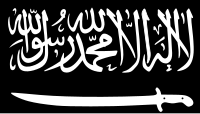Vilayat KBK
| United Vilayat of Kabarda, Balkaria and Karachay | |
|---|---|
| Participant in the Second Chechen War, Insurgency in the North Caucasus | |
 Flag of the Caucasus Emirate |
|
| Active | July 2002 (official declaration of the anti-Russian jihad in August 2004) – 7 October 2007 (Under various names)) 7 October 2007 – present (As United Vilayat of Kabarda, Balkaria and Karachay |
| Leaders |
|
| Area of operations | Russian North Caucasus (Kabardino-Balkaria and Karachay–Cherkessia) |
| Strength | The group's official cumulative total of 500 members in 2002–2007 (many less at any given time) Russian official estimate of no more than 50 active fighters in 2010 (not including supporters) |
| Part of |
|
| Originated as |
|
| Allies |
Vilayat Dagestan Vilayat Galgaycho Vilayat Nokhchicho |
| Opponents | Russia |
The United Vilayat of Kabarda-Balkaria-Karachai (UVKBK, Russian: Объединенный вилайят Кабарды, Балкарии и Карачая), also known as Vilayat KBK, is a militant Islamist Jihadist organization connected to numerous attacks against the local and federal security forces in the Russian republics of Kabardino-Balkaria and Karachay-Cherkessia in the North Caucasus. Vilayet KBK has been a member of the Caucasus Emirate group since 2007.
The group drew most of its early members from the Balkars, a small ethnic minority in the republic. However, their long-time leader between 2005 and 2010, Anzor Astemirov (Emir Sayfullah), was a Kabardin. Members come from other ethnic groups, including the Karachays and ethnic Russians. The group was named after the 7th-century Battle of Yarmouk.
The group began as a moderate non-violent organization named the Islamic Center in 1993. The group was renamed the Jamaat of Kabardino-Balkaria when it was not allowed to re-register under the original name in 1997. The focus of the group gradually changed because of persecution by Valery Kokov, the long-time ruler of the Republic of Kabardino-Balkaria, who labeled all alternatives to the local branch of the Spiritual Board of Russia's Muslims, operating the only official mosque in the republic, as Wahhabis, and indiscriminately and brutally harassed them.
Yarmuk was founded as a unit of around 30 Balkars and Kabardinians led by Muslim Atayev (Emir Sayfullah), which trained at the Chechen warlord Ruslan Gelayev's camp in Pankisi Gorge, Georgia. In 2002 the group helped Gelayev's forces in a raid of the village of Galashki in the Republic of Ingushetia. Upon their return to Kabardino-Balkaria, Atayev and his men launched a recruitment drive among alienated and radicalized youth. Mounting pressure from a continued crackdown led the group's leader, Mussa Mukozhoyev (Musa Mukozhev), to join the underground. Many local young radicals had joined the Islamic Peacekeeping Army that invaded the republic of Dagestan from Chechnya in 1999 or fought on the Chechen separatist side in the Second Chechen War.
...
Wikipedia
